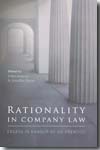After Enron
improving corporate Law and modernising securities regulation in Europe and the US
- ISBN: 9781841135311
- Editorial: Hart Publishing
- Fecha de la edición: 2006
- Lugar de la edición: Oxford. Reino Unido
- Encuadernación: Rústica
- Medidas: 24 cm
- Nº Pág.: 711
- Idiomas: Inglés

At the end of the twentieth century, it was thought by many that the Anglo-American system of corporate governance was performing effectively. Some observers claimed to see an international trend towards convergence around this model, in which firms raise finance on capital markets from dispersed investors, and corporate governance seeks to keep managers accountable to shareholders. There can be no denying that the recent corporate governance crisis in the US - Enron and related scandals - has caused many to question their faith in this view. This collection of essays provide a comprehensive attempt to answer the following questions: firstly, what went wrong - when and why do markets misprice the value of firms, and what was wrong with the incentives set by Enron? Secondly, what has been done in response, and how well will it work - including essays on the Sarbanes-Oxley Act in the US, UK company law reform and European company law and auditor liability reform, along with a consideration of corporate governance reforms in historical perspective. Three approaches emerge. The first two share the premise that the system is fundamentally sound, but part ways over whether a regulatory response is required. The first view argues that the events of the 'fall' have indicated a need for greater regulation to curb the excesses of the market. The second view suggests that Enron was merely an aberration, which 'self-corrected' anyway, and consequently the regulatory response has been unnecessarily restrictive. The third view, in contrast, argues that the various scandals demonstrate fundamental weaknesses in the Anglo-American system itself, which cannot hope to be repaired by the sort of reforms that have taken place. It is for the reader, and ultimately history, to decide which view is correct.
Eds. John Armour, Joseph A. McCahery







